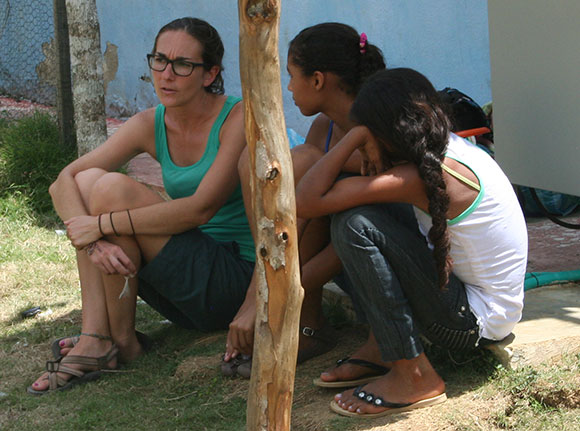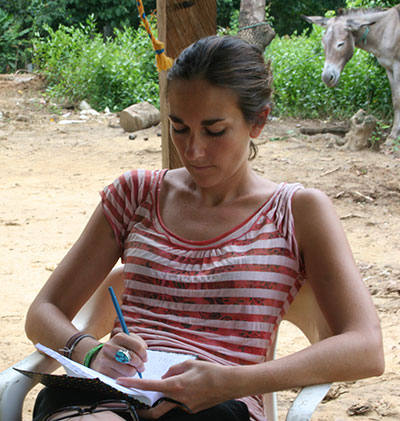
Angela Lederach talks with young people in Colombia during a Youth Provokers for Peace movement camping trip, which helped youth connect across villages that had been divided by armed conflict.
________________
The young people of war-torn northern Colombia want their homes and their lifestyle back.
Displaced from their villages by guerilla and paramilitary groups, they have spent the last 10 years in urban centers—making them prime targets for recruitment by those same criminal enterprises.
But rather than falling prey to a violent cause, they’ve founded a successful peace-building movement.
Notre Dame Ph.D. student Angela Lederach ’07 wants to know why.
“The youth in this movement are remarkable because most of them are seeking to return and continue farming,” said Lederach, who is pursuing a joint Ph.D. in anthropology and peace studies. “My research is focused on what motivates widespread youth participation in community-based peace activism, and how their participation enables them to imagine a possible future for themselves.”
Spaces of Peace
Lederach has spent the last two summers living in Cartagena, Colombia, researching the Peaceful Movement of the Alta Montaña. She plans to return in August for at least a year to continue researching the organization for her dissertation.
Bringing an anthropological lens to the study of peace processes has been invaluable, she said.
“Anthropology involves a commitment to long-term ethnographic research—observation while participating in the daily life of the people—and it reveals different forms and practices that you might not get in larger quantitative studies or generalized historical narratives,” Lederach said.
“You get the daily complexities of what it means to live in the midst of violence and the ways that people not only survive but find ways to flourish within that and create spaces of peace.”
During her first summer in Colombia, Lederach was surprised by the level of meaningful youth participation in the movement. More than 600 young people from 52 villages now participate in the youth wing of the organization.
“It’s a great group of people, and it’s really hopeful,” she said. “They recently met with the president, which is remarkable because they’re in a rural area quite far from the capital. They’ve been really effective in gaining traction and visibility in a very short period of time.”
Generosity of Knowledge
 Lederach writing field notes in Alta Montaña, Colombia.
Lederach writing field notes in Alta Montaña, Colombia.
Lederach, a Notre Dame Presidential Fellow who in March won a Fulbright U.S. Student Award in support of her dissertation research, said the Notre Dame anthropology program is distinct for its integrated approach to the field.
“In the U.S., anthropology typically encompasses four subfields—biological, linguistic, sociocultural, and archaeological. And often, in practice, that means you have these disciplinary silos,” Lederach said. “But the way Notre Dame integrates these fields exposes us to very different kinds of literature and ways of thinking, which can bring up surprising questions that otherwise wouldn’t happen.”
Her work with Professor Agustín Fuentes, who chairs the department, has led her to consider her research through a biological, multi-species lens.
“Agustín has a very generous approach to knowledge that pushes the boundaries we often construct in the academy,” Lederach said. “I didn’t come into the program thinking I would be drawing from that literature, but it has been an important body of work to engage with as I try to understand the impact of violence and displacement on ecological relationships—the farmers’ relationships to their land and their animals and what it means when they are torn asunder.”
Culture of Collaboration
Lederach majored in anthropology and peace studies as an undergraduate at Notre Dame and has worked and researched in Central America, West Africa, and Southeast Asia.
In 2011, she co-authored a book on healing and reconciliation, When Blood and Bones Cry Out: Journeys Through the Soundscape of Healing and Reconciliation, with her father, John Paul Lederach, a professor of international peacebuilding at the Kroc Institute for International Peace Studies.
She was excited, she said, to return to Notre Dame to join the newly created graduate program in anthropology and peace studies.
“It’s been a fantastic program,” Lederach said. “We have small cohorts and that enables a collaborative environment among colleagues and classmates. We receive individual support to start engaging with our research interests immediately—even in our core classwork. It’s a different kind of training we’re receiving here.”
Originally published by Carrie Gates at al.nd.edu on April 06, 2016.